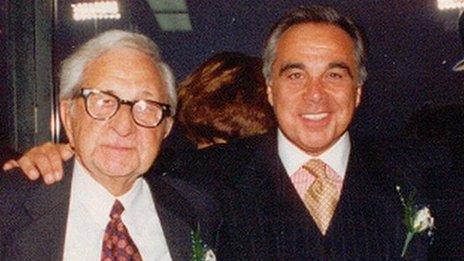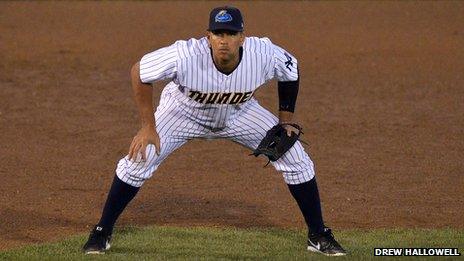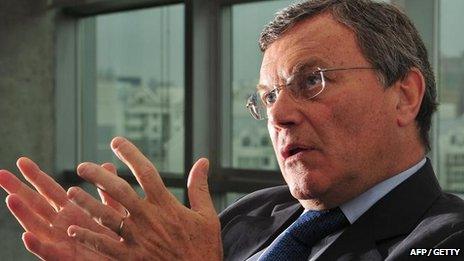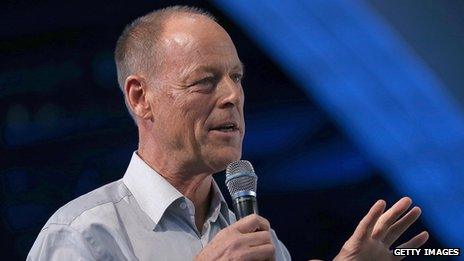What my dad taught me: Top bosses reveal parents' influence
- Published
Chief executives of some of the world's biggest firms credit their success to their upbringing.
As a child Joe Plumeri watched each night as his father carefully hung up his suit and shirt ready for the next day's work.
"You've got to get up in the morning and be ready to go," his dad, Samuel, would say.
But when Samuel reached his 80s and was recovering from a quintuple bypass, Joe urged him to rest.
His father had other ideas - deciding his next project would be to try to rejuvenate their home city of Trenton, New Jersey by, of all things, buying a baseball team.
Fearing the project would damage his dad's health, Joe tried to put him off.

Joe Plumeri (right) says the older he gets, the smarter his father gets
But Samuel persevered, persuading the city to build a $16m (£9.5m) stadium and then calling baseball team owners across the US until he found a team and persuaded his son to help him buy it.
Joe is now a co-owner of the Trenton Thunder team, and the stadium's presence has attracted further development including restaurants and offices, delivering his dad's dream.
"My father believed anything was possible so I believe anything is possible," he says.

Joe Plumeri co-owns minor league baseball team, the Trenton Thunder
Joe's career, he is currently vice chairman of global payments firm First Data, has been driven by this philosophy. The former chief executive and chairman of global insurance broker Willis, he successfully returned it from private to public ownership and led its $2.1bn purchase of Hilb Rogal & Hobbs - one of the largest insurance brokerage deals of the last decade.
And he is not alone in business in taking on board the pearls of parental wisdom. Chief executives of some of the world's biggest firms credit their success to their upbringing.

Sir Martin takes a hands on approach to running WPP after his father told him not to lose track of the detail
Sir Martin Sorrell is the founder and chief executive of the world's largest advertising firm WPP. He says his father had to leave school at 13 and was particularly ambitious for his son after his other son - born a year before Sir Martin - died at birth.
And it was his dad's advice that persuaded Sir Martin to choose one firm as the path to growth, buying a stake in the British firm that initially made wire shopping baskets, and, via acquisitions, building it into a company now worth an estimated £16.4bn.
"He always said, 'Build a reputation in an industry that you enjoy. Then if you want to get involved in running a company that's already established, make it your life's work. Don't flit from opportunity to opportunity.'"
Sir Martin, now in his late 60s, says the hands on approach he takes to running the firm, for example signing off on all senior employees who are hired, stems from his father's advice.
He warned him: "If you... withdraw yourself from the detail, you lose touch."

Would you call your parents to ask for advice about work?
Leadership expert Steve Tappin says chief executives' success is often down to their parents' influence.
"The drive and values that came from their upbringing and their parents is what sets many chief executives apart," he says.
Walter Robb, co-chief executive of natural foods supermarket chain Whole Foods, says he still calls his dad to ask for his advice about work issues, and says his father has had an "incredible influence" on him, particularly on how he treats his staff.
"He just continues to be a real mentor to me in terms of thinking about how I show up and how I speak and I think probably ultimately ethics and integrity, like do the right thing by people and that sort of basic value system."

Walter Robb says his dad has had a big impact on how he communicates with and treats his staff
Similarly, Guo Guangchang, the founder and chairman of one of China's most powerful companies Fosun, believes his business would not exist at all if it were not for his parents.
When he decided to set up the Hong Kong-listed conglomerate after graduating from university, his sole motivation was to earn money so he could provide a better standard of living for his parents.
"The priority was to have the money to support my parents, so that they could have a better life," he says.
Despite his success, his parents urged him to use his wealth to contribute to society rather than their comfort. Thanks to them, he says he has learnt to focus not just on the financial side of growing his firm, but also on its philosophy and long-term culture.
His parents' main concern, he says, would be that he treats his staff well.
And John Donahoe, chief executive of online auction site eBay, says that after each quarterly results, whether good or bad, his dad sends him an email telling him he's done a good job and that he's proud of him.
Mr Donahoe says he currently depends most on the advice his father gave him growing up.
"'Ask questions, probe, listen, learn.' I got that advice from my father 50 years ago when I was growing up," he says, "and that's still probably the advice I apply the most each and every day."
This feature is based on interviews by leadership expert Steve Tappin for the BBC's CEO Guru series, produced by Neil Koenig and Evy Barry.